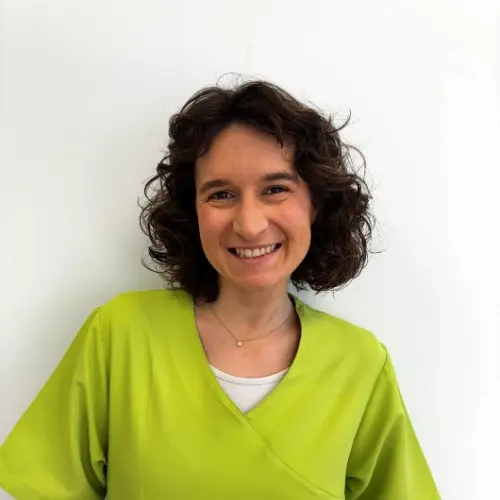
Blanca Olmedo has taken a further step in her professional development by certifying as a Clinical Partner of SIODERV. In this interview, she shares how this process has allowed her to view her daily practice from a new perspective, appreciate her evolution, and reaffirm her commitment to continuous education and the professional community.
What has been your professional career in the field of optics-optometry?
My first professional contact in optics-optometry was at an optical store in Pontevedra, where I had the opportunity to learn a lot about the day-to-day operations of a business. Thanks to them, I have a great fondness for that part of our profession.
After the COI Master's program, I spent a couple of years working in Madrid. First at a Visual Therapy center and then creating the Visual Therapy service within a hospital in Alcorcón. Both experiences helped me grow as an optometrist, understand the limits of my learning at that time, and identify my professional needs. Among them, I was missing a team.
I found that team again in Pontevedra, this time at the Videre Optometry Center, where I settled in February 2022. If I had been able to grow in Madrid, here I expanded into a new dimension. I feel that I have a much more integral and complete vision of optometry, and that is reflected in how I treat patients. I have been able to properly organize all the foundational knowledge that I had a bit disordered in my head, and to this day I am finding the place and the time to train in new areas.
What motivated you to start the journey towards the Clinical Partner certification at SIODERV?
It was precisely that thirst for knowledge and the desire to evolve as an optometrist that led me to start this process. Having to develop my own clinical case so deeply made me analyze my way of working and my perspective on optometry.
I am a strong advocate for reinventing oneself and regularly self-evaluating as optometrists. I believe our profession is growing very quickly, and if we want to do it well, we must stay up to date. This process allowed me to feel that I was doing just that, taking a step forward in my career as an optometrist and analyzing my work style from my own perspective.
What would you highlight about the process? How did you experience it?
When presenting a case from some time ago, I really enjoyed the final part of the case discussion because I was able to see mistakes that I didn't notice at the time of treatment and think of other ways to approach the same case that didn't come to my mind when I had it in front of me.
I believe that, even if it's just for this final section, everyone should analyze a case of their own in this way every year, in order to learn from themselves and improve their daily work if possible.
Has all this journey influenced your daily clinical practice?
Yes, there has been a change in the way I think about my cases. It may be something that fades over time or something that stays with me forever, but now when I am analyzing a case that I am handling at that moment, the thought always crosses my mind: "If this were a clinical case, would I be proud of what I am presenting? Would I change anything?"
A fundamental part of the evaluation is the presentation of a clinical case. How did you select yours and what did you learn while preparing it?
At first, I thought about selecting a complicated or challenging case that I had dealt with, but in the end, I decided on a more "everyday," more common case. A case of oculomotor function with binocular inefficiency was what I selected because it is something we frequently encounter in the clinic and with which I felt comfortable enough to explain all the steps I had followed.
From a complicated case, you will always learn something, but I thought that if I could learn from a simpler case, I would have really done a good job of analysis.
What does it mean to you to be part of SIODERV as a Clinical Partner?
The transition from General Partner to Clinical Partner doesn't seem to me like a huge paradigm shift, but I do feel that I belong more closely to the SIODERV community. At some point, I may consider continuing my training towards the Fellow process, so I will continue to prioritize ongoing education in my daily life.
Did your expectations regarding this process get met? What aspects would you improve?
Totally. It was a simple and relatively quick process. I liked that not only was the clinical case corrected, but also that notes were attached regarding the aspects that could have been improved in my presentation.
What would you say to other professionals who are considering getting certified?
Let them take a step forward. It is an opportunity for self-evaluation and a minimal investment of time for the benefit it brings. It is a very educational process where we can demonstrate the competencies we have at a professional level and our ability to analyze our clinical practice.
Will you attend the IX International Congress of SIODERV? What role do you think this event plays in the consolidation of the SIODERV community?
Since I can, I attend all the editions of the SIODERV congress. This congress lays the foundations of the community of optometrists who share the same line of thought. It is an opportunity to get to know better the people in this community and those who have just begun their adventure in the world of optometry.
